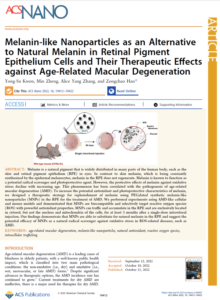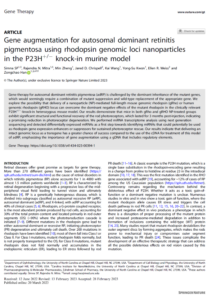

Over almost a decade at UNC, gene and drug delivery expert Zongchao Han, MD, PhD, has conducted translational research focused on developing novel and alternative therapies to treat retinal diseases via biomedical nanoparticle applications. In March 2023, Gene Therapy* featured a study led by Dr. Han that achieved intact genomic nanoparticle delivery of rhodopsin DNA to mitigate the degenerative effects of this gene’s mutation in autosomal dominant retinitis pigmentosa (adRP), an inherited retinal disorder. 
In October 2022, the journal American Chemical Society Nano** published an investigation faculty-mentored by Dr. Han that demonstrated melanin-like nanoparticles (MNPs) as a viable, therapeutic substitute for natural melanin in retinal pigment epithelium (RPE) cells in treating patients with age-related macular degeneration (AMD). In experimentation, Han’s lab used AMD-like cellular and mouse models that demonstrated MNPs as capable of selectively targeting cell-signaling reactive oxygen species (ROS) molecules with powerful antioxidant properties. The study models demonstrated that using synthetic, PEGylated — polyethylene glycol (PEG) covalent conjugation with modified biological molecules — melanin-like nanoparticles (MNPs) in RPE cells carried therapeutic potential to replenish natural melanin in AMD patients. Study authors concluded that MNPs provided an effective means of therapeutically reducing oxidative stress and served as a natural radical scavenger against (ROS)-related diseases such as AMD.
Funded by UNC Ophthalmology, the Carolina Eye Research Institute (CERI) is home to Dr. Han’s lab and its widely respected, cross-disciplinary studies advancing novel therapeutic approaches and nanoparticulate drug delivery systems to treat retinal disorders linked to chronic diseases. Dr. Han’s investigative teams are primarily comprised of members within the three University departments where he holds joint faculty appointments: 1) UNC Department of Ophthalmology (Associate Professor); 2) UNC Eshelman School of Pharmacy (Division of Pharmacoengineering & Molecular Pharmaceutics – Associate Professor); and 3) UNC’s interdepartmental Curriculum In Genetics And Molecular Biology program (Faculty). Major projects under development within Dr. Han’s lab at the CERI include:
- Multifunctional nanoparticle carrier system capable of therapeutic gene and drug delivery to targeted cell populations found in AMD patients, as an alternative and novel approach where standard treatment options will not work or are not available.
- Injectable hydrogels to treat retinal disorders such as AMD, diabetic retinopathy, and eye tumors, which demonstrate favorable response to various therapeutic agents delivered via sustained release.
- Novel biomedical applications of nano-antioxidants such as melanin and nanoceria (CeNPs) to treat AMD via the auto-regenerative properties of ROS with powerful antioxidant properties that scavenge in vivo.
The October 2022 and March 2023 studies conducted by Dr. Han lab have benefitted the ophthalmic nanomedicine research community. They demonstrate successful experimentation toward developing surrogate nanoparticulate delivery systems to mediate the degenerative effects of a range of inherited retinal disorders such as adRP and AMD. Dr. Han noted:
“Using natural pigment melanin to inhibit photochemical reactions and photosensitized oxidation on photoprotection generated data that highlight a potential treatment option for patients with AMD. Our study design produced a safe and effective melanin-based therapy with long-term efficacy through a single intravitreal injection for both dry and wet AMD patients. Our study indicates these treatments may be effective in other retinal disorders such as diabetic retinopathy, which have oxidative stress in common and are challenged by current standard approaches.
Gene therapy for autosomal dominant retinitis pigmentosa [adRP] is challenged by the dominant inheritance of the mutant genes, which would seemingly require a combination of mutant suppression and wild-type replacement of the appropriate gene. We explore the possibility that delivery of a nanoparticle (NP)-mediated full-length mouse genomic rhodopsin (gRho) or human genomic rhodopsin (gRHO) locus can overcome the dominant negative effects of the mutant rhodopsin in the clinically relevant P23H+/–knock-in heterozygous mouse model. Our study indicates that delivery of a single full-length gRho or gRHO NP may lead to prolonged transgene expression and delayed photoreceptor cell death.”
* Simna Sp, Mitra RN, Zheng M, Chrispell JD, Wang K, Kwon Y-S, Weiss ER, Han Z. Gene Augmentation for Autosomal Dominant Retinitis Pigmentosa Using Rhodopsin Genomic Loci Nanoparticles in the P23H+/- Knock-in Murine Model. Gene Ther. 2023 Mar 20. doi: 10.1038/s41434-023-00394-1.
** Kwon Y-S, Zheng M, Zhang AY, Han Z. Melanin-like Nanoparticles as an Alternative to Natural Melanin in Retinal Pigment Epithelium Cells and Their Therapeutic Effects against Age-Related Macular Degeneration. ACS Nano 2022, 16, 11, 19412–19422.
